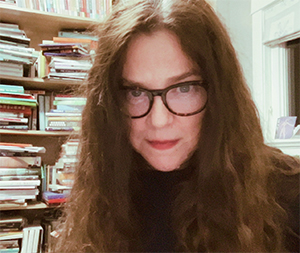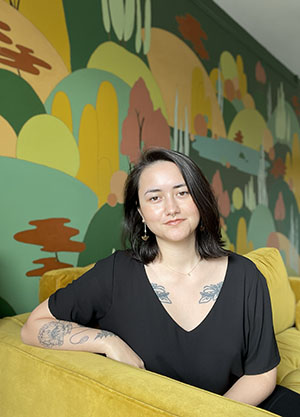A Generative Force:
L'Amour Lisik interviews Eleanor Fuller

Managing Editor L'Amour Lisik talks with Eleanor Fuller, winner of our 2023 Far Horizons Award for Short Fiction with her story, “The Hennessy Family Rosary” (featured in fall issue #224). They discuss finishing her degree, first draft flops, and crafting an ending that feels true to the story.
Read an excerpt of "The Hennessy Family Rosary" here.
Eleanor Fuller's fiction appears in The Moth, The Manchester Review, The New Quarterly, and The Antigonish Review. An MFA candidate at the University of British Columbia, she volunteers on the Editorial Board at Prism International and is currently at work on a SSHRC-supported collection of short stories. She lives in Toronto.
Congratulations on your contest win! Judge Susan Sanford Blades said, “This is a story that plays out just as much between its lines as it does on the page, and rewards subsequent readings.” I found this especially true in the opening paragraphs, which brilliantly hint at several themes yet to come: “We pray to the One who makes by undoing. Buttons, shorts, bodies, family.” Can you give us an idea of your process when crafting a story like this, where form mirrors content—layers hidden under layers, the POV passed around to different family members just as baby Lou is transferred from one caregiver to the next?
Thanks L’Amour! What a sweet surprise! I’d been in one of those rejection slumps where everything is coming back no. I submitted to the contest fully resigned to yet another no, so I was totally floored and grateful when I got your email!
This story started as an exercise in a fiction course on constraints, with Annabel Lyon. Because it was spring session, the course came with a built-in constraint of its own: compressed time, a full term crammed into six weeks or so. We wrote like mad!
I kept coming back to these characters—Siobhán was especially tenacious—in weekly exercises, so it felt natural to follow them in my final assignment: a 2500-word story with the near impossible challenge of combining at least four technical constraints we had studied. To be honest, my first go was a real flop. My critique group was polite about it, but we all laughed. What a mess! The rosary beads as structuring principle came from misunderstanding what my prof meant by modular structure. The parts of my story can’t really be moved around like a modern sofa! So that was another fail as far as the assignment went, but also a happy mistake because it fit the story and allowed for natural breaks between character POVs.
The priest’s robe askew on its hanger was there from the beginning, but I didn’t know why until later. Early drafts of the story were all 1st person—dizzying shifts between unreliable narrators! My thesis supervisor, Nancy Lee, later suggested I try the voices in a close 3rd. This helped the story feel way more coherent.
A big part of the layering comes, I think, from experimenting with negative space. I decided to try making absent characters central to the dramatic tension between the sisters. Amazing what a generative force absence is. I have to remember that!
Though the themes, characters, and relationships in the story feel universal and timeless, “The Hennessy Family Rosary” opens with “Sunday, July 29th, 1979. St. Patrick’s Ward, Guelph, Ontario, Canada.” What led you to set the story in such a specific place and time?
I don’t live there now, but I love Guelph. My mom grew up in the Ward—back when it was still a deeply working-class neighbourhood, full of Irish and Italians. Growing up, I’d heard many stories about life in the Ward, so it seemed a natural setting for this one.
For the long-distance call to feel urgent, I also needed the setting to be pre-mobile, pre-information age. I didn’t want the sisters to be able to Google stuff or carry a phone out of the house.
Because most of the story is told from young Siobhán’s perspective, quite a lot is left unsaid. Lou’s parentage, their mother’s whereabouts, and Father Beniamino’s intentions are all left up to the reader to decipher based on the pieces we’re given. How do you balance how much to trust to the reader in a story like this that hinges on the characters’ secrets, body language, and family dynamics?
Good question, and I’m not sure! Assume readers enjoy sorting things out without you telling them every last thing? Honestly, I tend to overwrite my first drafts and spend the next several taking things out. I’ve heard writers say the story is smarter than you are. I believe that. Maybe we just have to tune our ear to it? Pare until the story says stop?
Without giving too much away, the ending involves a certain supernatural element. What were you hoping that readers took away from this final scene? Is there a possibility that you’d expand the story into a novella or novel, and we’d see more characters’ perspectives and a furthering of the supernatural?
I take George Saunders’s advice on endings: the best ones are surprising yet inevitable. I’m not sure I’ve met that criterion here, but I hope the ending feels true to the world of the story.
Yeah, you’ve got canny good instincts because I think there is a whole novel lurking in this story. My prof thought so too. I am hoping to start outlining that soon to see where it goes. Aiming at a multi-generational saga and just as curious to see what happens to the supernatural element! I’m probably a literary realist at heart, but who doesn’t love a little magic?
You’re currently an MFA candidate at UBC and you volunteer on PRISM’s editorial board. How do these two communities influence your craft and editorial eye? What advice would you give to writers thinking of pursuing an MFA or wanting to volunteer with a literary journal?
I actually defended my creative thesis in October, so I’ve officially finished the degree. Guess I’ll have to change my bio now. That’ll be bittersweet. I wonder if everyone feels this bereft on graduating.
I went into the MFA loving words but not really understanding story structure, so I’d say the degree was transformational. Volunteering at Prism teaches me how critical the first page of anything is. Readers aren’t the most forgiving crowd. If we don’t give them a problem worth solving on the first page, they’re likely to hit the snooze button and sleep through the rest. This is a hard lesson for me because I’m all about the preamble, or I was. The other thing volunteering on an ed board forces you to do is to articulate your reactions in craft terms. When a story comes through the queue, you can’t just tell the editor “Oh, loved that,” or “Meh, not for me.” You have to say why, and that invariably brings you back to craft.
On the MFA or any literary project, my advice is: go for it. Don’t wait like I did. In my twenties, I figured I had nothing worth saying. Then I decided academia was more practical. Ha ha! Then, I figured I was too old. Finally, I figured out that I was just being a coward and got on with it. Best decision ever. Also, you’ll get a whole new set of friends who are all as crazy (about literature) as you are!
Can you tell us more about the Social Sciences and Humanities Research Council-supported collection of short stories that you’re working on? Are you reading anything right now as research for your stories, or perhaps as a break from the work?
Although this story isn’t, more than half of the collection is set in Toronto’s Annex neighbourhood. Place takes on symbolic value in stories that ask what it means to belong (whether to a city, a family, a marriage, a friendship) and what happens when our sense of belonging is ruptured by loss. Like most urban neighbourhoods, the collection is peopled eclectically, by mothers, daughters, sisters, poets, jocks, lawyers, lovers, fortune tellers, philandering philosophy professors, even a grumpy Latin teacher. . ..
At some point, I’ll work up the courage to send it out. But first, more revisions! Plus, I’m hoping to bridge another one of the stories into a longer form project, this one a campus novel, so I’ve loads to do!
As for reading, I’ve been really caught up in the latest Irish renaissance. I just finished Anne Enright’s The Wren, The Wren. She manages shifting perspectives with all the brilliance, intelligence, and insight you’d expect of her. Plus, the birds! It’s like she’s inside my head—besides bird-loving Siobhán, lost magpies and augury show up in my stories. Now, I’m on to Aingeala Flannery’s The Amusements which bills itself as a novel but feels more like a linked collection to me. Every chapter takes on a new character perspective. I find this really appealing because I want to write novels but have fallen hopelessly in love with the short story! What a thrill to see someone having it both ways.

L'Amour Lisik
* * * * * * * *









